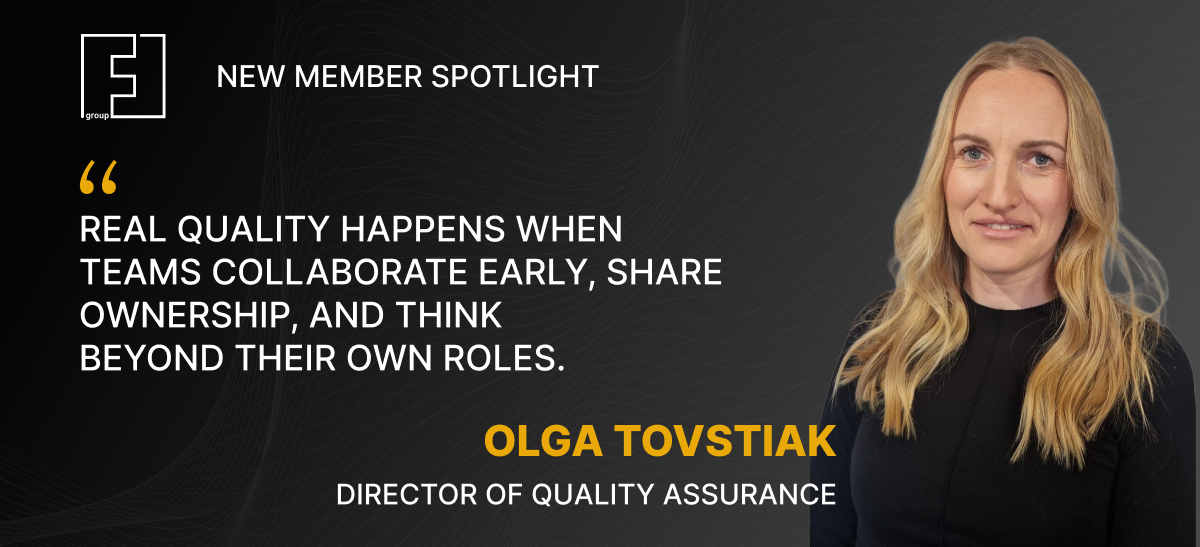
Olga joined FF Group with a clear mission: to bring structure, clarity, and collaboration into every layer of our quality assurance process. With a passion for smart, scalable solutions and a deep belief that real quality starts with teamwork, she’s already making a measurable impact.
From automated testing improvements to long-term process planning, Olga is helping ensure our AI-powered technologies don’t just work — they work reliably in the real world. Get to know her thoughts on quality, Smart City tech, and the underrated power of communication in the spotlight below 👇
What inspired me to join FF Group as Head of QA was the opportunity to contribute directly to the quality of innovative AI-powered solutions that have a real-world impact on traffic safety and urban mobility. I saw a chance not only to improve product reliability but also to help shape quality practices that support the company’s growth and long-term scalability.
At FF Group, the technology we build doesn’t just live in code — it interacts with the physical world, on the roads, in cities, and in people’s everyday lives. Ensuring the quality of such systems goes far beyond functional testing — it’s about building trust, ensuring safety, and enabling consistent performance in dynamic, real-time environments. That mission resonated with me deeply.
Even though I’ve been at FF Group for just a month, I’ve already helped bring more structure and clarity to our QA processes. I mapped out the current state, identified key issues, and created a long-term improvement plan. At the same time, I introduced quick wins — like enabling the team to run existing automated regression tests and share results during releases, which improved visibility and reduced manual work.
I wouldn’t say I have a favorite product yet — what excites me most right now is understanding the full ecosystem and identifying how quality can support each product's growth.
I believe FF Group has the potential to evolve from a product-focused company into a strategic player in the Smart City and mobility intelligence space. Our current expertise — in license plate recognition, vehicle classification, and real-time edge analytics — gives us a unique entry point into understanding traffic behavior at scale.
By building on this foundation, we can move toward delivering actionable mobility intelligence — helping cities and operators not just identify vehicles, but also understand patterns, detect anomalies, predict risks, and support data-driven decisions around traffic flow, safety, and urban planning.
We can proactively develop modular solutions tailored for broader use cases: smart intersections, low-emission zones, dynamic tolling, traffic enforcement, or integration with smart infrastructure platforms. That’s how we can fill a niche — by becoming a real-time traffic intelligence layer for future urban environments.
When you join a new company or project, it’s like entering a whole new world where you need to find your way. The challenge is to quickly get a clear understanding of the overall situation and define key focus areas to work on. From there, I mapped out small, manageable steps across all these areas to start making progress. That was my first important task or challenge to solve.
One thing I’ve learned in my career — and wish I had understood earlier — is that anything done in isolation rarely leads to the best results. QA is not a final gate or a separate checkpoint at the end of development. Real quality happens when teams collaborate early, share ownership, and think beyond their own roles. The most effective QA work I’ve seen comes from building strong connections with developers, product managers, and other stakeholders.
At some point, I realized how important it is to balance work and personal life to stay truly productive. I really enjoy participating in technical conferences and writing technical posts and articles — it’s a passion that sits right at the intersection of my work and personal interests. Outside of that, I make sure to dedicate quality time to my family — my husband and son. I’m also a big tennis fan; it’s my favorite way to recharge, and I often find that many ideas come to me during or after playing. I love hiking as well — being in nature helps me reset and stay inspired.
I believe the most underrated skill in our industry today is effective communication paired with the confidence to speak up. It’s not just about technical know-how, but also about actively participating in requirement discussions, voicing concerns or improvement ideas without fear, and analyzing from a broader business perspective. In QA, this means looking beyond just finding bugs — it’s about understanding the impact on the product and the business, and collaborating closely with all stakeholders to deliver real value.
The rule of small tasks is my main approach: done — see results, done — see results, which creates visible progress and a clear sense of accomplishment.
There’s a saying that “laziness is the engine of progress”. I’ve always been fascinated by smart solutions that simplify tasks, open up new possibilities, and make life easier. Working with technology means constantly improving how we do things — and that’s something I find genuinely exciting.